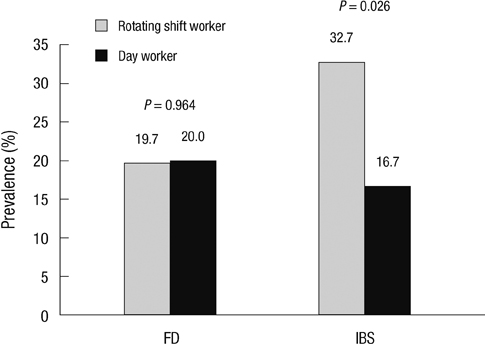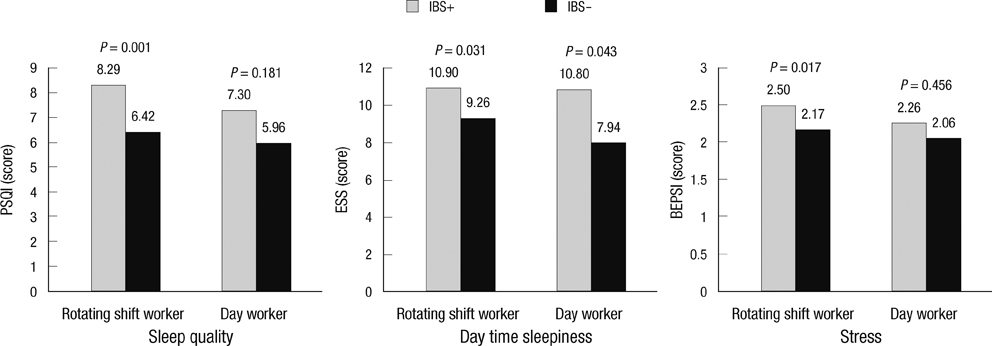J Korean Med Sci.
2013 Mar;28(3):431-437. 10.3346/jkms.2013.28.3.431.
Impact of Shiftwork on Irritable Bowel Syndrome and Functional Dyspepsia
- Affiliations
-
- 1Department of Internal Medicine, Ewha Medical Research Institute, Ewha Womans University School of Medicine, Seoul, Korea. jassa@ewha.ac.kr
- KMID: 1786942
- DOI: http://doi.org/10.3346/jkms.2013.28.3.431
Abstract
- Disturbances in biological rhythms could lead to unfavorable health impact. This study aimed to evaluate the prevalence of functional dyspepsia (FD) and irritable bowel syndrome (IBS) in rotating shift workers, and to determine the factors that have significant association with the prevalence of FD and IBS. The research had been carried out among nurses and nursing assistants working at Ewha Womans University Mokdong Hospital between December 2010 and February 2011. The subjects completed self-reported questionnaires, including the quality of the sleep and the level of stress. The prevalence of FD and IBS defined by ROME III criteria, and factors associated the disorders in rotating shift workers were compared with those of day workers. A total of 207 subjects were included in the study with 147 rotating shift workers (71.0%), and 60 (29.0%) day workers. The prevalence of IBS in rotating shift workers was higher than that in day workers (32.7% vs 16.7%, P = 0.026). However, no significant difference in the prevalence of FD was observed between the two groups (19.7% vs 20.0%, P = 0.964). In the multivariate analysis, the risk factors for IBS were rotating shift work (OR, 2.36; 95% CI, 1.01-5.47) and poor sleep quality (OR, 4.13; 95% CI, 1.82-9.40), and the risk factors for FD were poor sleep quality (OR, 2.31; 95% CI, 1.01-5.28), and severe stress (OR, 2.19; 95% CI, 1.06-4.76). A higher prevalence of IBS among rotating shift workers could be directly associated with the circadian rhythm disturbance. The circadian rhythm disturbance may be related with the pathogenesis of IBS.
MeSH Terms
Figure
Cited by 1 articles
-
Relationship of Shift Work to Gastrointestinal Disorders in Hospital Nurses
Eun-Ju Kim, Hye-Sun Jung, Eun-hi Choi
Korean J Health Promot. 2014;14(4):172-179. doi: 10.15384/kjhp.2014.14.4.172.
Reference
-
1. Longstreth GF, Thompson WG, Chey WD, Houghton LA, Mearin F, Spiller RC. Functional bowel disorders. Gastroenterology. 2006. 130:1480–1491.2. Lawal A, Kern M, Sidhu H, Hofmann C, Shaker R. Novel evidence for hypersensitivity of visceral sensory neural circuitry in irritable bowel syndrome patients. Gastroenterology. 2006. 130:26–33.3. Piche T, Barbara G, Aubert P, Bruley des Varannes S, Dainese R, Nano JL, Cremon C, Stanghellini V, De Giorgio R, Galmiche JP, et al. Impaired intestinal barrier integrity in the colon of patients with irritable bowel syndrome: involvement of soluble mediators. Gut. 2009. 58:196–201.4. Saito YA, Talley NJ. Genetics of irritable bowel syndrome. Am J Gastroenterol. 2008. 103:2100–2104.5. Drossman DA, Camilleri M, Mayer EA, Whitehead WE. AGA technical review on irritable bowel syndrome. Gastroenterology. 2002. 123:2108–2131.6. Bennett EJ, Tennant CC, Piesse C, Badcock CA, Kellow JE. Level of chronic life stress predicts clinical outcome in irritable bowel syndrome. Gut. 1998. 43:256–261.7. Mulak A, Bonaz B. Irritable bowel syndrome: a model of the brain-gut interactions. Med Sci Monit. 2004. 10:RA55–RA62.8. Solmaz M, Kavuk I, Sayar K. Psychological factors in the irritable bowel syndrome. Eur J Med Res. 2003. 8:549–556.9. Hayee B, Forgacs I. Psychological approach to managing irritable bowel syndrome. BMJ. 2007. 334:1105–1109.10. Haug TT, Svebak S, Wilhelmsen I, Berstad A, Ursin H. Psychological factors and somatic symptoms in functional dyspepsia: a comparison with duodenal ulcer and healthy controls. J Psychosom Res. 1994. 38:281–291.11. Jones MP, Maganti K. Symptoms, gastric function, and psychosocial factors in functional dyspepsia. J Clin Gastroenterol. 2004. 38:866–872.12. Wang XS, Armstrong ME, Cairns BJ, Key TJ, Travis RC. Shift work and chronic disease: the epidemiological evidence. Occup Med (Lond). 2011. 61:78–89.13. Brown DL, Feskanich D, Sánchez BN, Rexrode KM, Schernhammer ES, Lisabeth LD. Rotating night shift work and the risk of ischemic stroke. Am J Epidemiol. 2009. 169:1370–1377.14. Song HJ, Jung HK, Yeom HJ. Reliability and validity of Korean bowel disease questionnaire and prevalence of functional gastrointestinal disorders in Korea. Gut. 2009. 58:A112.15. Sohn SI, Kim DH, Lee MY, Cho YW. The reliability and validity of the Korean version of the Pittsburgh Sleep Quality Index. Sleep Breath. 2012. 16:803–812.16. Buysse DJ, Reynolds CF 3rd, Monk TH, Berman SR, Kupfer DJ. The Pittsburgh Sleep Quality Index: a new instrument for psychiatric practice and research. Psychiatry Res. 1989. 28:193–213.17. Johns MW. A new method for measuring daytime sleepiness: the Epworth sleepiness scale. Sleep. 1991. 14:540–545.18. Buysse DJ, Hall ML, Strollo PJ, Kamarck TW, Owens J, Lee L, Reis SE, Matthews KA. Relationships between the Pittsburgh Sleep Quality Index (PSQI), Epworth Sleepiness Scale (ESS), and clinical/polysomnographic measures in a community sample. J Clin Sleep Med. 2008. 4:563–571.19. Johns MW. A new method for measuring daytime sleepiness: the Epworth sleepiness scale. Sleep. 1991. 14:540–545.20. Baldi F, Ferrarini F, Longanesi A, Ragazzini M, Barbara L. Acid gastroesophageal reflux and symptom occurrence: analysis of some factors influencing their association. Dig Dis Sci. 1989. 34:1890–1893.21. Gisbert JP, Cooper A, Karagiannis D, Hatlebakk J, Agréus L, Jablonowski H, Nuevo J. Impact of gastroesophageal reflux disease on work absenteeism, presenteeism and productivity in daily life: a European observational study. Health Qual Life Outcomes. 2009. 7:90.22. Cathébras PJ, Robbins JM, Kirmayer LJ, Hayton BC. Fatigue in primary care: prevalence, psychiatric comorbidity, illness behavior, and outcome. J Gen Intern Med. 1992. 7:276–286.23. Yim JH, Bae JM, Choi SS, Kim SW, Hwang HS, Heo BR. The validity of modified korean-translated BEPSI (Brief Encounter Psychosocial Instrument) as instrument of stress measurement in outpatient clinic. J Korean Acad Fam Med. 1996. 17:42–49.24. Agrawal A, Whorwell PJ. Irritable bowel syndrome: diagnosis and management. BMJ. 2006. 332:280–283.25. Barbara G, De Giorgio R, Stanghellini V, Cremon C, Corinaldesi R. A role for inflammation in irritable bowel syndrome? Gut. 2002. 51:i41–i44.26. McFarland LV. State-of-the-art of irritable bowel syndrome and inflammatory bowel disease research in 2008. World J Gastroenterol. 2008. 14:2625–2629.27. Caruso CC, Lusk SL, Gillespie BW. Relationship of work schedules to gastrointestinal diagnoses, symptoms, and medication use in auto factory workers. Am J Ind Med. 2004. 46:586–598.28. Knutsson A. Health disorders of shift workers. Occup Med (Lond). 2003. 53:103–108.29. Zhen Lu W, Ann Gwee K, Yu Ho K. Functional bowel disorders in rotating shift nurses may be related to sleep disturbances. Eur J Gastroenterol Hepatol. 2006. 18:623–627.30. Cremonini F, Camilleri M, Zinsmeister AR, Herrick LM, Beebe T, Talley NJ. Sleep disturbances are linked to both upper and lower gastrointestinal symptoms in the general population. Neurogastroenterol Motil. 2009. 21:128–135.31. Han SH, Lee OY, Bae SC, Lee SH, Chang YK, Yang SY, Yoon BC, Choi HS, Hahm JS, Lee MH, et al. Prevalence of irritable bowel syndrome in Korea: population-based survey using the Rome II criteria. Korean J Neurogastroenterol Motil. 2006. 12:183.32. Fass R, Fullerton S, Tung S, Mayer EA. Sleep disturbances in clinic patients with functional bowel disorders. Am J Gastroenterol. 2000. 95:1195–1200.33. Kim YG, Yoon DY, Kim JI, Chae CH, Hong YS, Yang CG, Kim JM, Jung KY, Kim JY. Effects of health on shift-work: general and psychological health, sleep, stress, quality of life. Korean J Occup Environ Med. 2002. 14:247–256.34. Lu WZ, Gwee KA, Moochhalla S, Ho KY. Melatonin improves bowel symptoms in female patients with irritable bowel syndrome: a double-blind placebo-controlled study. Aliment Pharmacol Ther. 2005. 22:927–934.35. Ko HJ, Kim MA, Kwon YS. The fatigue experience of shiftwork nurse. J Korea Community Health Nurs Acad Soc. 2004. 18:103–118.36. Nojkov B, Rubenstein JH, Chey WD, Hoogerwerf WA. The impact of rotating shift work on the prevalence of irritable bowel syndrome in nurses. Am J Gastroenterol. 2010. 105:842–847.37. Spiller R, Aziz Q, Creed F, Emmanuel A, Houghton L, Hungin P, Jones R, Kumar D, Rubin G, Trudgill N, et al. Guidelines on the irritable bowel syndrome: mechanisms and practical management. Gut. 2007. 56:1770–1798.38. Rahimi R, Nikfar S, Rezaie A, Abdollahi M. Efficacy of tricyclic antidepressants in irritable bowel syndrome: a meta-analysis. World J Gastroenterol. 2009. 15:1548–1553.
- Full Text Links
- Actions
-
Cited
- CITED
-
- Close
- Share
- Similar articles
-
- Inflammation and Overlap of Irritable Bowel Syndrome and Functional Dyspepsia
- Post-Infectious Irritable Bowel Syndrome, an Inflammation-Immunological Model with Relevance for Other IBS and Functional Dyspepsia
- Update on Genetic Studies of Functional Gastrointestinal Disorders
- Overlap Syndrome of Functional Dyspepsia and Irritable Bowel Syndrome - Are Both Diseases Mutually Exclusive?
- Overlap in Patients With Dyspepsia/Functional Dyspepsia




